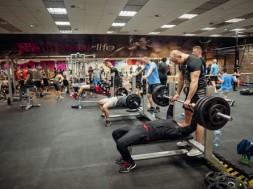Fitness has become lately one of the most popular methods of physical training, having now all the rights to claim the status of mass sport. The word comes from English and it crossed over all linguistic barriers, being translated as ‘physical shape’, ‘physical state’, ‘general physical training’, ‘health state’, etc.
Deriving from women body building, which was losing its popularity, fitness has recently become an official sport. As a performance sport, fitness requires specific native qualities, like any other competitional sport. The most important qualities are: a balanced bone structure, ectomorf or mesomorf somatic type, skills, speed. For those less familiarized with contests in this sport, we mention that in women competition there are three events: evening dress, swimming suit and a floor gymnastics program.
Coming back to mass fitness, we must specify that, to a great extent, its popularity is due to its accessibility. At first, the methods used in fitness were largely adopted from body building, but then they started to differentiate more and more from those of the other sports. Therefore, we now have a specific method in fitness, with a great diversity of exercises.
Another advantage of fitness is that the training programs can be personalized according to the possibilities and objectives of each person. However, there is a constant in all the programs, and that is the balanced development of at least three motion parameters: strength, resistance and mobility – physical qualities which are closely related to the health state that fitness involves. This specification is necessary, because it makes the difference from the doping cases (in these situations, the sportsman’s physical shape can be outstanding, while his health state is definitely not).
The training programs include a very diverse area of aerobic and anaerobic exercises. The programs can be taken no matter of age, as long as they are done under competent supervision and are well assimilated. It’s possible and it’s even advisable to change the training programs from time to time in order to avoid routine and revive participants’ interest. The diet and the program of rest and recovery are very important. Sport dietetics has developed significantly lately and it is now specialized according to different sports, so fitness has its own nutritional recommendations, meant to sustain physical effort and recovery after training.
In fitness, physical exercise is, up to a certain level, a means of relaxation in itself. However, there are also other methods of recovery, like sauna, massage, reflexology, hydrotherapy, etc.
Besides the obvious benefits that the body has from fitness, the psychological effects of the training programs are remarkable and this type of physical exercise can even have a prophylactic role in depression and psychological instability.
All the advantages of regular practice of fitness can be best understood only during months and years of uninterrupted exercise, when every new program supports the conviction that it is highly necessary to train every day.





